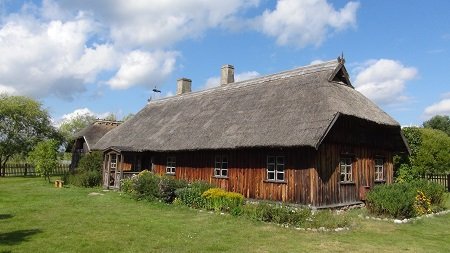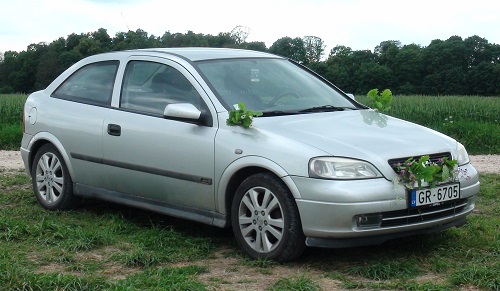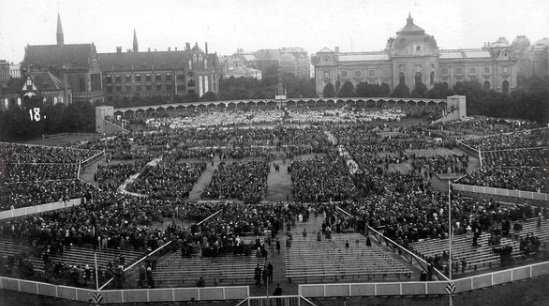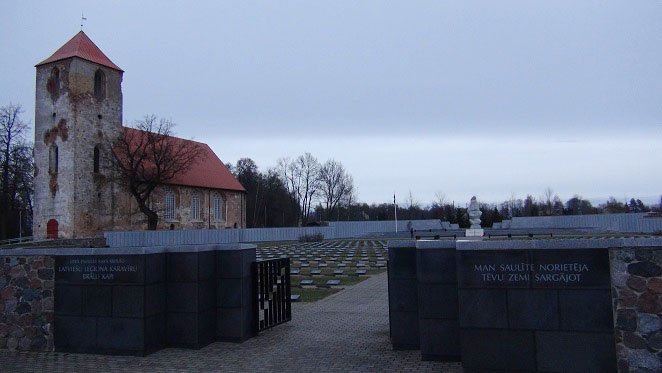Latvians are Latvia‘s original inhabitants, having arrived to the location at least 4000 years ago. They speak their own Latvian language which (together with Lithuanian) is part of the Baltic Group.
Most Latvians are light-haired and genetically closest to Lithuanians, Estonians and Finns. Lutheranism is their most popular faith. The eastern fifth of Latvian nation is known as Latgalians; they follow Catholicism and speak a unique Latgalian dialect.
Key parts of Latvian culture include their songs (and regular Song Festivals), language and ice hockey (national sport).
History has not been kind to Latvians, and Latvians never had a country of their own prior to 20th century.
Instead, they just worked their lands, recognizing nobles from neighboring countries as their overlords. First to arrive were Germans (who converted Latvians into Christianity). Then came Lithuanians, Poles and Swedes (16th century) and finally the Russians (18th century). Each of these powers dominated Latvia‘s cities and high society while Latvian majority continued to toil in the fields.

During the 19th century however Latvians enjoyed a national awakening. More and more Latvian peasants moved into cities, becoming industrial workers, specialists, artists and businessmen. They recognized their own culture and language as no worse than either German or Russian. They had to wait until World War 1 (and the defeats of both Russia and Germany therein) to finally make the miracle and declare a free Latvia.

The brief period of prosperous independence was a high point for the Latvian nation and culture, but the worst was still to come. In 1940 Russia (renamed Soviet Union) occupied Latvia once again and launched a Genocide. The numbers of Latvians were hit hard, never to come back up again. Perceived as no less dangerous was the mass settling of Latvian cities by Russians. By 1970s Latvians were already a minority in their own cities. They made up only 52% of Latvia‘s total population in 1989 (down from 76% in 1935). A couple more decades would have made them outnumbered by Russians in their homeland, dashing the hopes of ever being free again.

But the Soviet Empire started crumbling. Under the slogan „now or never“ Latvians achieved their freedom in 1990. The challenges have not ended however: half of the urban inhabitants were Russians and they spoke no Latvian language (whereas almost every Latvian spoke Russian). To preclude a situation where Latvian culture would be sidelined by Russian even after independence, Latvians rather boldly Latvianised the public inscriptions and established strict requirements for knowledge of Latvian language. These effectively disenfranchised some Soviet settlers, making it impossible for Russians to outvote Latvians in most elections.

While the share of Latvians increased to 62,1% as some Russians left, Latvians continue to feel like a beleaguered nation, fearing that changing “political winds” and another rise of imperialism in Russia may subdue them once again, perhaps using Latvia‘s Soviet era minorities as a “fifth column”.

Great story. Hopefully Latvians will be able to survive another century as the tides are turning against them once again.
Who cares if Latvians are light haired and why no mention of the Nazi occupation in World War 2 ?
This is an article about the Latvian ethnic group and the most important things related to it. There is a longer article on the history of Latvia, which explains the Nazi German occupation as well: https://www.onlatvia.com/topics/history-and-today/history-of-latvia . Nazi German occupation is also mentioned in the articles about the other ethnicities, e.g. the Jews ( https://www.onlatvia.com/jews-50 ). To ethnic Latvians, it simply was not such a big event in the formation of their national consciousness to be mentioned in such a short article.
I am looking for Latvian and Lithuanian natives in the state of Michigan, in the USA for a voiceover project for an automotive company; do you know any? do you know any groups or websites I could contact? You can contact me at gurbano@global-lt.com
Thank you!
Regarding Lithuanians in Michigan, some institutions are mentioned here: http://global.truelithuania.com/detroit-michigan-10/ . You may contact them, e.g. the new church of the Detroit suburbs where many Lithuanian institutions are located.
Hi
I know some interest fact about this country
The total population of Latvia is 1,929,938 people. People in Latvia speak the Latvian language. The linguistic diversity of Latvia is rather diverse according to a fractionalization scale which for Latvia is 0.5795. The median age is approximately 41.4 years. Life expectancy in Latvia is 73.78.
Thanks